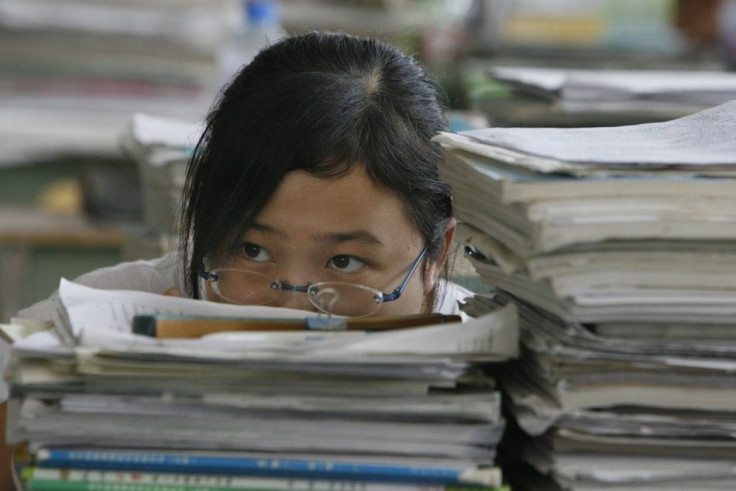Up To 90% Of East Asian Students Short-Sighted: Study

We have all likely heard this before: if we spend a lot of time reading, watching television, or straining our eyes in front of a computer screen, then we may eventually need glasses. However, a recent study has added a new spin to this commonly accepted notion -- and that is that the main cause of short-sightedness, especially throughout East Asia, is the not a result of spending heavy amounts of reading or even genetics alone, but instead it is caused by a lack of exposure to sunlight and the outdoors.
According to a recent study by Professor Ian Morgan of the Australian Research Council Centre of Excellence in Vision Science at the Australian National University in Canberra, short-sightedness is most prevalent in major Asian cities where an estimated 80 to 90 percent of children leaving school are short-sighted and require glasses.
And what is perhaps even more alarming is that some 10 to 20 percent of Asian students are said to have high myopia, a severe condition that can lead to loss of vision and even blindness.
For decades this especially high prevalence of myopia among Asians was attributed solely to genetics and to Asia's notoriously rigorous educational curricula which demand heavy focus on studying and reading.
However, Morgan suggests that the leading cause of myopia is actually the lack of sunlight and outdoor exposure that these intense study habits lead to.
The amount of time children spend on computer games [or] watching television can be a contributing factor. As far as we can tell it is not harmful in itself, but if it is a substitute for getting outside, then it is, explained Morgan to Agence French Press (AFP).
In other words, If children get outside sufficiently, Morgan told ABC News in an interview, then they will not become myopic even if they do a lot of studying.
There are some kids who study hard and get outside and play hard and they are generally fine, he added. The ones who are at major risk are the ones who study hard and don't get outside.
This may explain why cases of myopia are not as widespread in other nations such as Australia where study habits may be rigorous as well but where students spend more time outside, whether it be walking to school or at recess.
For instance, Morgan told AFP, the myopia prevalence among children of European origin [in Australia] is about 10 percent.
In, Britain the estimate was about 30 to 40 percent and in Africa virtually none -- in the range of two to three percent.
The reason for the lower numbers is not due to the fact that students in other countries are necessarily less studious than those in Asia, but rather that the schooling system integrates more time outdoors.
Morgan explained that children in East Asia basically go to school, they don't go outside at school, they go home and they stay inside. They study and they watch television.
The average student in Singapore for example spends only 30 minutes outdoors compared with a figure of three hours for their Australia counterparts.
The impression we get from the studies we've done in Sydney and studies in the United States [is] that if kids are getting out for about three hours a day then they're pretty safe, Morgan told ABC News.
So although Asia has it the worst, this study suggests that students anywhere with similar study habits to those in Asia and that do not spend enough time outside are also at high risk.
So can myopia as a condition be prevented?
Morgan suggests that it can. But to do so, major changes must be implemented in the Asian schooling systems to integrate more time outdoors into the everyday school curriculum.
It is going to require some sort of structural change in the way a child's time is organized in East Asia because there is so much commitment to schooling and there is also a habit of taking a nap at lunchtime, which is from our perspective prime myopia prevention time.
Another form of prevention for those students who want to avoid myopia: you may want to consider reading your books in the park, instead of the library.
© Copyright IBTimes 2024. All rights reserved.





















